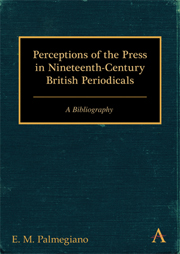Book contents
- Frontmatter
- Contents
- Preface
- Introduction
- Annotated Bibliography
- Ainsworth's Magazine, 1842–1854
- All the Year Round, 1859–1895
- Bentley's Miscellany, 1837–1868
- Bentley's Quarterly Review, 1859–1860
- Blackwood's Edinburgh Magazine, 1824–1900
- The British and Foreign Review, 1835–1844
- The British Quarterly Review, 1845–1886
- Chambers's (Edinburgh) Journal, 1832–1900
- The Contemporary Review, 1866–1900
- The Cornhill Magazine, 1860–1900
- The Dark Blue, 1871–1873
- The Dublin Review, 1836–1900
- The Dublin University Magazine, 1833–1880
- The Edinburgh Review, 1802–1900
- The Foreign Quarterly Review, 1827–1846
- The Fortnightly Review, 1865–1900
- Fraser's Magazine for Town and Country, 1830–1882
- Good Words, 1860–1900
- Hogg's (Weekly) Instructor, 1845–1856
- The Home and Foreign Review, 1862–1864
- Household Words, 1850–1859
- Howitt's Journal, 1847–1848
- The Leisure Hour, 1852–1900
- The London Quarterly Review, 1853–1900
- The London Review, 1829–1830
- Longman's Magazine, 1882–1900
- Macmillan's Magazine, 1859–1900
- The Modern Review, 1880–1884
- The Monthly Chronicle, 1838–1841
- Murray's Magazine, 1887–1891
- The National Review, 1855–1864
- The National Review, 1883–1900
- The New Monthly Magazine, 1821–1854
- The New Quarterly Magazine, 1873–1880
- The New Review, 1889–1897
- The Nineteenth Century, 1877–1900
- The North British Review, 1844–1871
- The Oxford and Cambridge Magazine, 1856
- The Prospective Review, 1845–1855
- The Quarterly Review, 1824–1900
- The Rambler, 1848–1862
- Saint Pauls, 1867–1874
- The Scottish Review, 1882–1900
- Tait's Edinburgh Magazine, 1832–1855
- Temple Bar, 1860–1900
- The Theological Review, 1864–1879
- Titan: A Monthly Magazine, 1856–1859
- The Westminster Review, 1824–1900
- Key to Indexes
- Author Index
- Subject Index
The Modern Review, 1880–1884
from Annotated Bibliography
Published online by Cambridge University Press: 05 May 2012
- Frontmatter
- Contents
- Preface
- Introduction
- Annotated Bibliography
- Ainsworth's Magazine, 1842–1854
- All the Year Round, 1859–1895
- Bentley's Miscellany, 1837–1868
- Bentley's Quarterly Review, 1859–1860
- Blackwood's Edinburgh Magazine, 1824–1900
- The British and Foreign Review, 1835–1844
- The British Quarterly Review, 1845–1886
- Chambers's (Edinburgh) Journal, 1832–1900
- The Contemporary Review, 1866–1900
- The Cornhill Magazine, 1860–1900
- The Dark Blue, 1871–1873
- The Dublin Review, 1836–1900
- The Dublin University Magazine, 1833–1880
- The Edinburgh Review, 1802–1900
- The Foreign Quarterly Review, 1827–1846
- The Fortnightly Review, 1865–1900
- Fraser's Magazine for Town and Country, 1830–1882
- Good Words, 1860–1900
- Hogg's (Weekly) Instructor, 1845–1856
- The Home and Foreign Review, 1862–1864
- Household Words, 1850–1859
- Howitt's Journal, 1847–1848
- The Leisure Hour, 1852–1900
- The London Quarterly Review, 1853–1900
- The London Review, 1829–1830
- Longman's Magazine, 1882–1900
- Macmillan's Magazine, 1859–1900
- The Modern Review, 1880–1884
- The Monthly Chronicle, 1838–1841
- Murray's Magazine, 1887–1891
- The National Review, 1855–1864
- The National Review, 1883–1900
- The New Monthly Magazine, 1821–1854
- The New Quarterly Magazine, 1873–1880
- The New Review, 1889–1897
- The Nineteenth Century, 1877–1900
- The North British Review, 1844–1871
- The Oxford and Cambridge Magazine, 1856
- The Prospective Review, 1845–1855
- The Quarterly Review, 1824–1900
- The Rambler, 1848–1862
- Saint Pauls, 1867–1874
- The Scottish Review, 1882–1900
- Tait's Edinburgh Magazine, 1832–1855
- Temple Bar, 1860–1900
- The Theological Review, 1864–1879
- Titan: A Monthly Magazine, 1856–1859
- The Westminster Review, 1824–1900
- Key to Indexes
- Author Index
- Subject Index
Summary
The Modern, the offshoot of the Theological Review, opened with a thoughtful essay on periodical literary criticism.
1. The Editor [Richard A. Armstrong]. “The Story of Nineteenth Century Reviewing.” 1 (1880): 1–33.
Commenced with Daniel Defoe's Review, “the father of the Tatler and the Spectator ” but not the Gentleman's Magazine. The last was “the first great literary review” even though it was initially a serial summary of newspapers. Soon MPs brought their speeches for publication, which Edward Cave printed at the risk of ‘fearful penalties.’ Between the Gentleman's and the early nineteenth century's “great outburst of Review literature,” a few other periodicals started. The Monthly Review was its “only respectable English rival.” The Scots Magazine was as good but not other Scottish productions. The intellectual Monthly Magazine had some “pleasant banter.” Other periodicals, 1760–1800, were “trivial to a degree that now would be intolerable.”
Recounted the birth of the Edinburgh Review, attributing its success to the “splendid ability” of early writers and its reflection of audience political interests. The Edinburgh pioneered reviewing as an “independent essay” rather than as a recitation of contents. Editor Francis Jeffrey “slashed” articles as circulation grew, from 750 at birth to 12,000 in 1813. The Review had “extraordinary influence over policy and letters,” but its literary criticism could be “not only unjust, but sometimes pernicious.” It shot “stinging sarcasm against all things mean and base” making enemies in the process.
- Type
- Chapter
- Information
- Perceptions of the Press in Nineteenth-Century British PeriodicalsA Bibliography, pp. 393 - 394Publisher: Anthem PressPrint publication year: 2012



